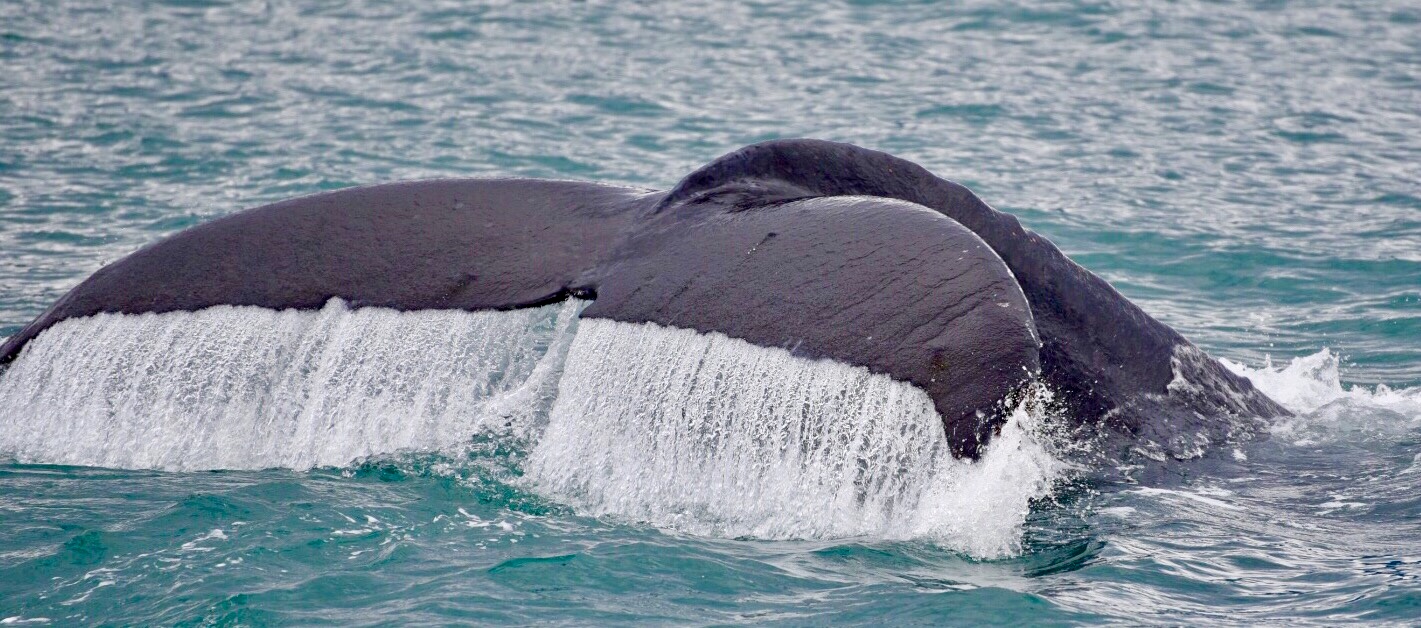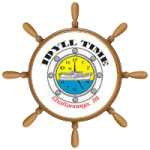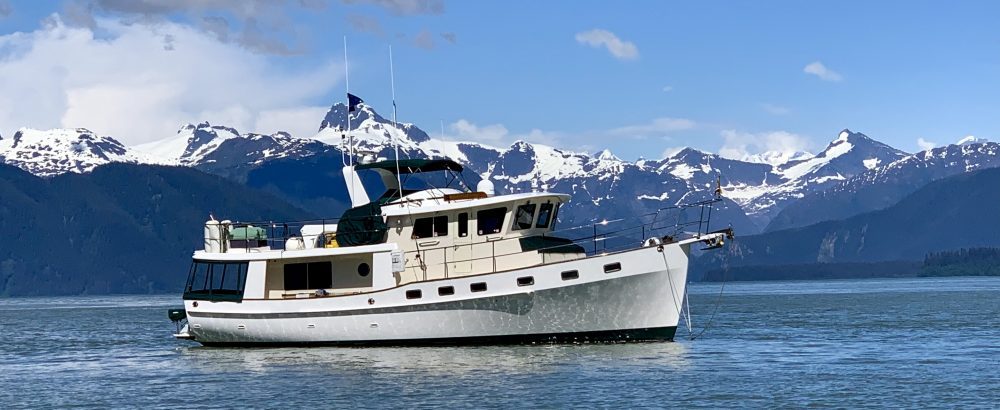
itadmin
Glacier Bay
After a four day wait in Hoonah, the winds have finally calmed down and it looks like a great day for crossing Icy Strait. Our wait in Hoonah paid off and we have flat seas for the entire crossing. Other than a solo sea otter doing the backstroke, we are all alone.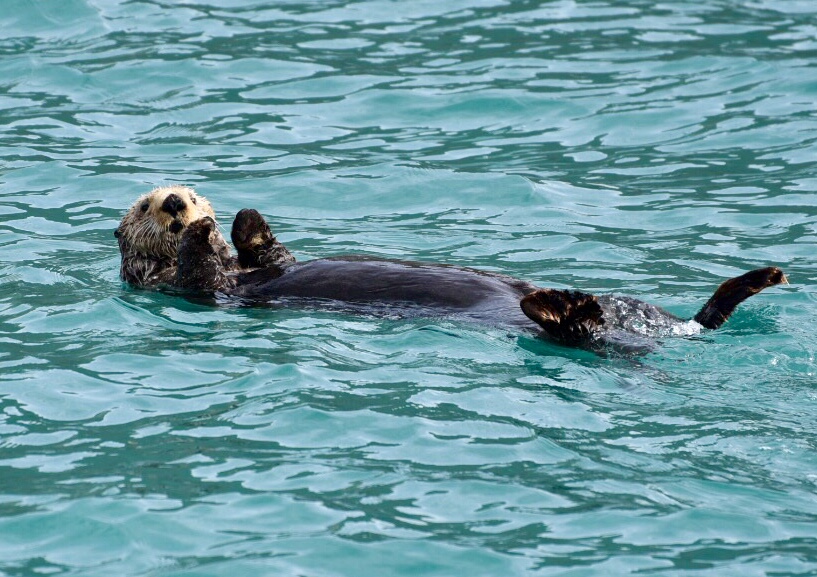 The magnificent Mt. Fairweather Range soon comes into view.
The magnificent Mt. Fairweather Range soon comes into view.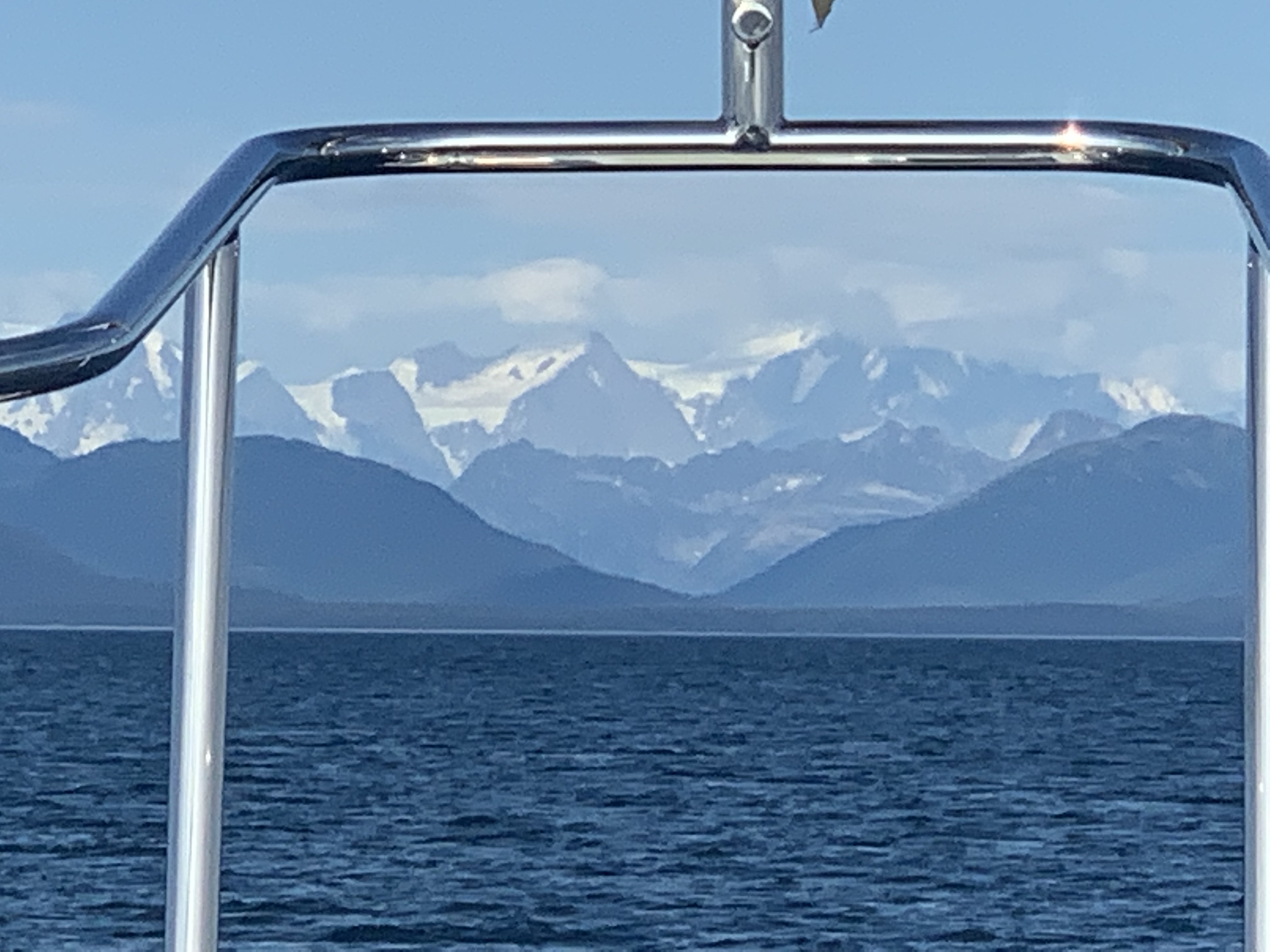 Reaching the park boundaries between Pt. Carolus and Pt. Gustavus, we radio “KWM20 Bartlett Cove” and ask for permission to enter. Permission granted along with instructions for travel into Bartlett Cove as these waters are considered “Whale Waters” and the park wants to make sure whales are protected from collision and disturbance. We applied for a short notice permit two days ago while in Hoonah. Only 25 private vessels and two cruise ships are permitted to enter the park each day. Thirteen private vessel permits are issued 60 days in advance and 12 permits are issued within 48 hours. These permits are good for seven days and are no charge. We visited the park last year and had not planned on coming in this year so we did not apply for the advance permit. While in Hoonah, we decided to try for a short notice permit and had no difficulty in obtaining one at this time of year as most of the boaters are already starting their migration south.
Reaching the park boundaries between Pt. Carolus and Pt. Gustavus, we radio “KWM20 Bartlett Cove” and ask for permission to enter. Permission granted along with instructions for travel into Bartlett Cove as these waters are considered “Whale Waters” and the park wants to make sure whales are protected from collision and disturbance. We applied for a short notice permit two days ago while in Hoonah. Only 25 private vessels and two cruise ships are permitted to enter the park each day. Thirteen private vessel permits are issued 60 days in advance and 12 permits are issued within 48 hours. These permits are good for seven days and are no charge. We visited the park last year and had not planned on coming in this year so we did not apply for the advance permit. While in Hoonah, we decided to try for a short notice permit and had no difficulty in obtaining one at this time of year as most of the boaters are already starting their migration south.
After tying up at the Park headquarters dock in Bartlett Cove, we attend a mandatory one hour orientation on boating in Glacier Bay.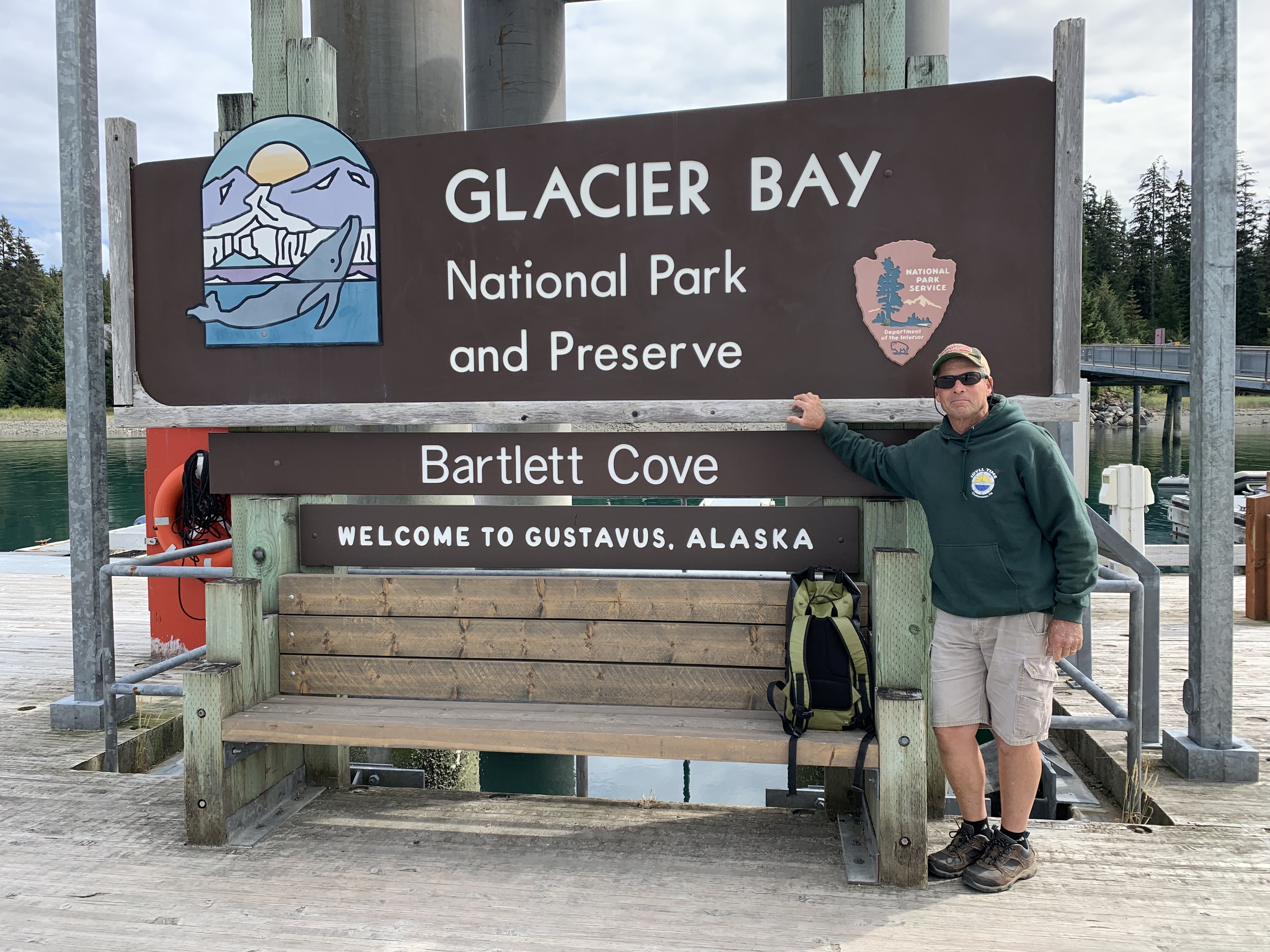
After our orientation, we spend several hours exploring the park headquarters and lodge grounds. Snow, a well known humpback whale in the park, was killed by a cruise ship strike in 2001. She was believed to be 44 years old. Her skeleton is now on permanent display. At 45 ½ feet, this is one of the worlds largest humpback whale skeleton displays.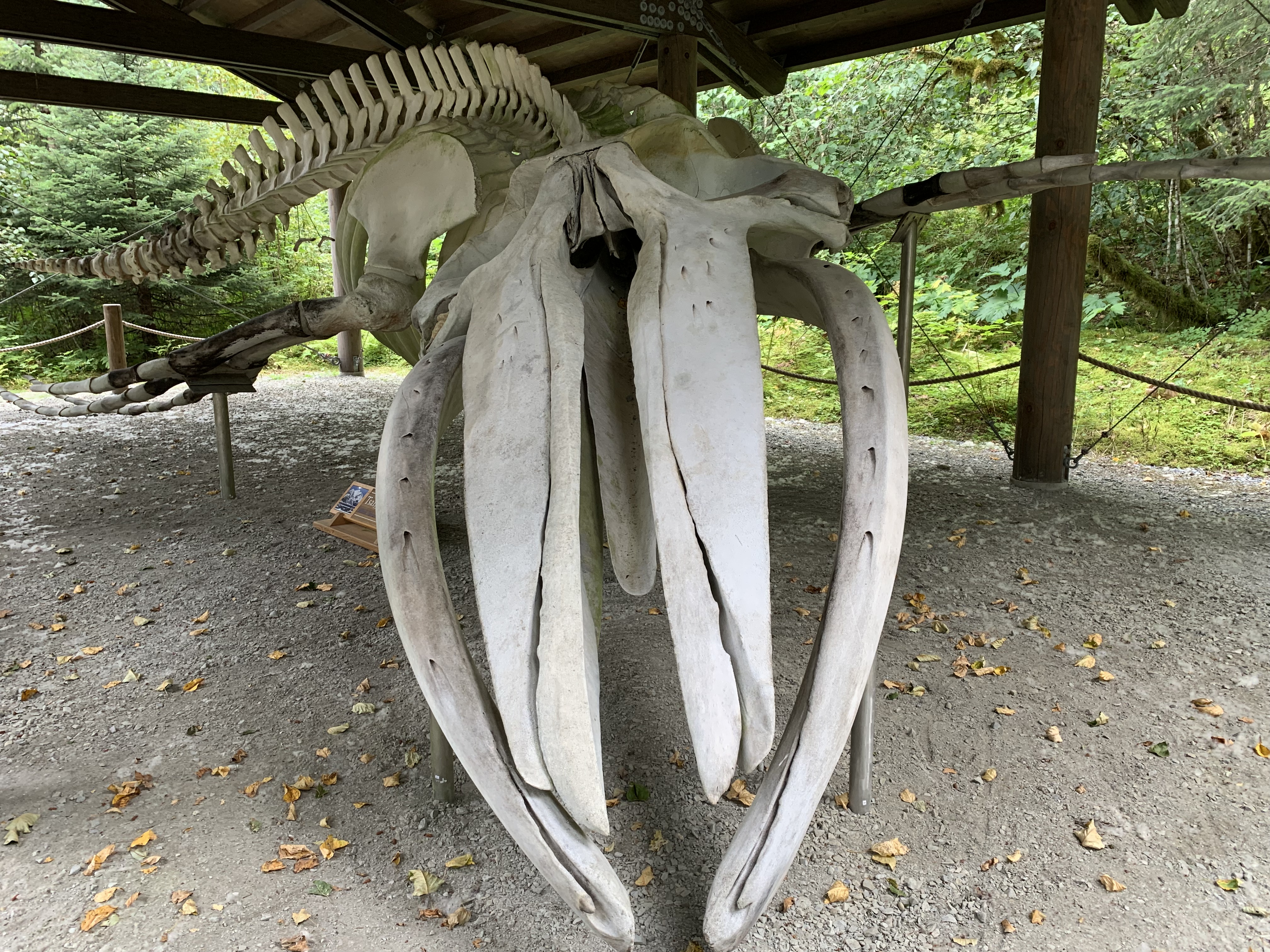
With a favorable current in Sitakaday Narrows, we decide to continue “up bay” this afternoon. As we approach South Marble Island, we begin to see the Stelar sea lions lazing on the rocky shores.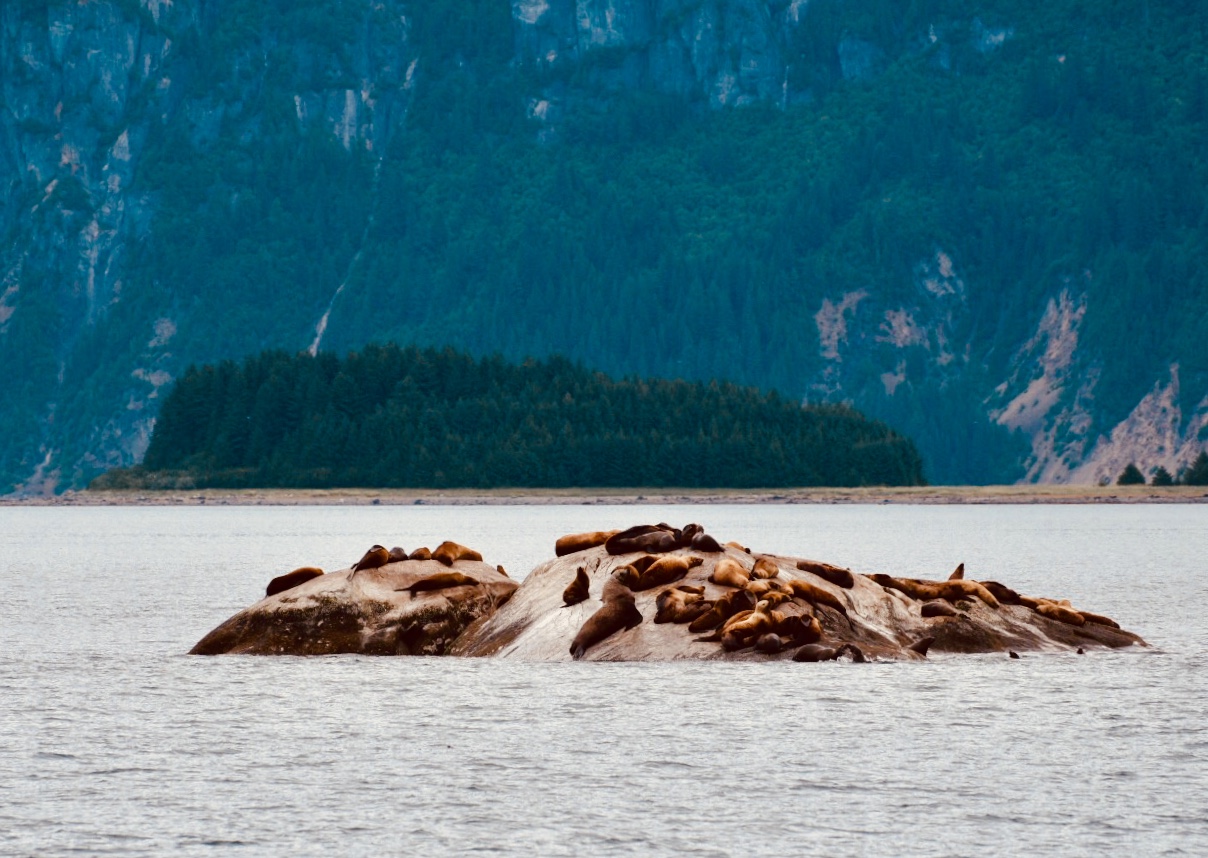 Their smell and vocal noise are strong evidence of their numbers. Several Tufted Puffins are bobbing in the 57 degree waters.
Their smell and vocal noise are strong evidence of their numbers. Several Tufted Puffins are bobbing in the 57 degree waters.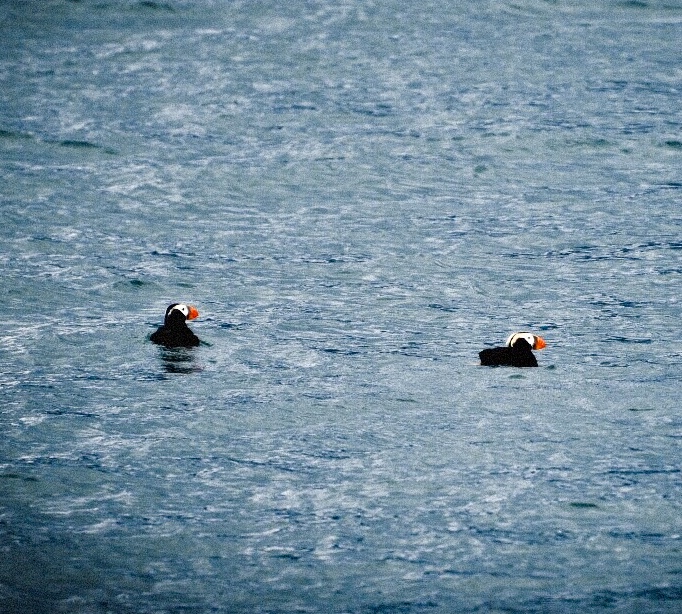 A lone whale is feeding nearby.
A lone whale is feeding nearby.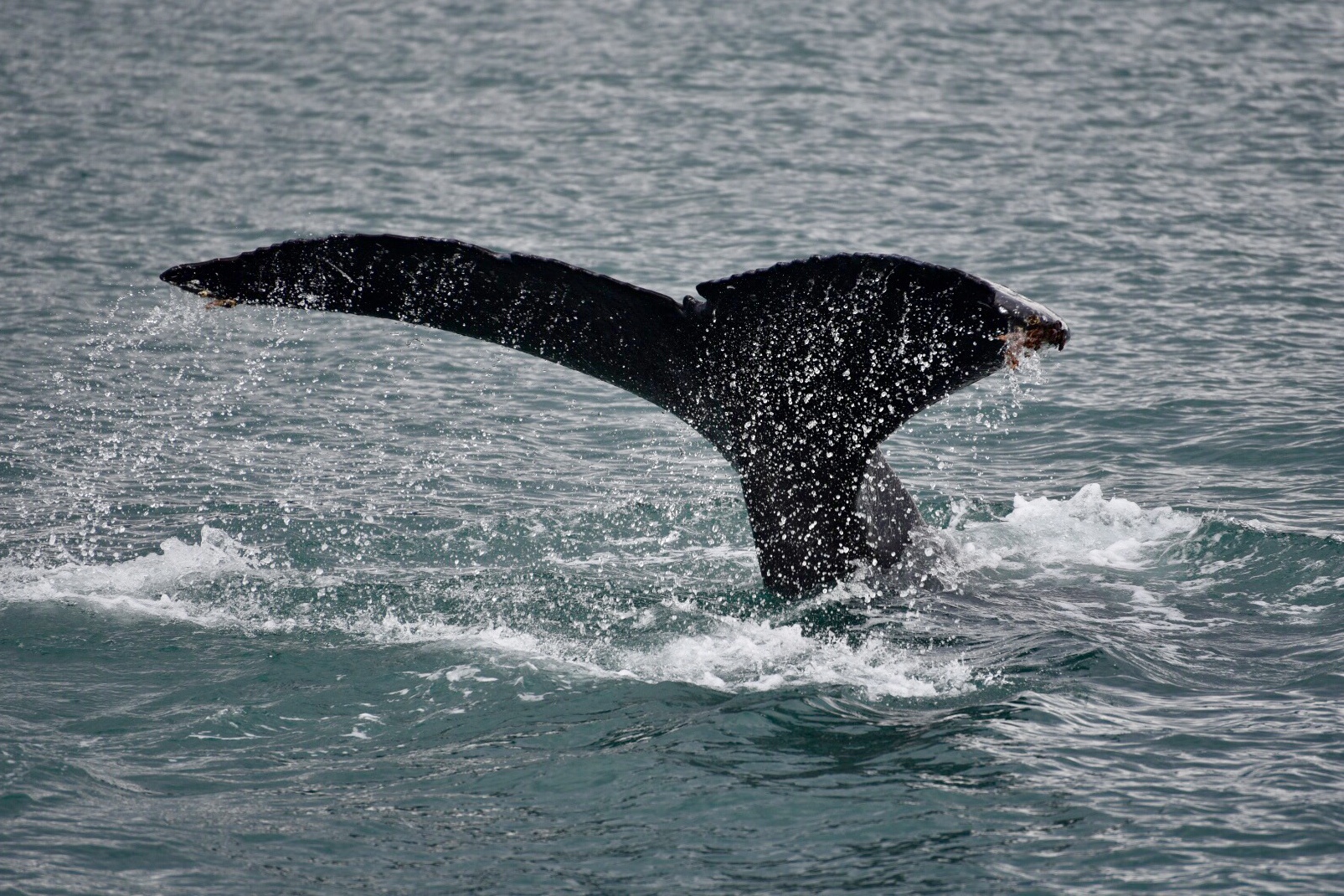
Our anchorage for the evening is North Sandy Cove. Just after anchoring, we see two wolves running back and forth along the woods edge. They appear to be hunting something but soon disappear. We have this secluded anchorage all to ourselves. It was a great first day in Glacier Bay.
North Sandy to Reid Glacier:
It is a blustery morning as we exit our anchorage in North Sandy and work our way up bay. Nat Geo and the cruise ship Eurodam are also heading up towards the glaciers.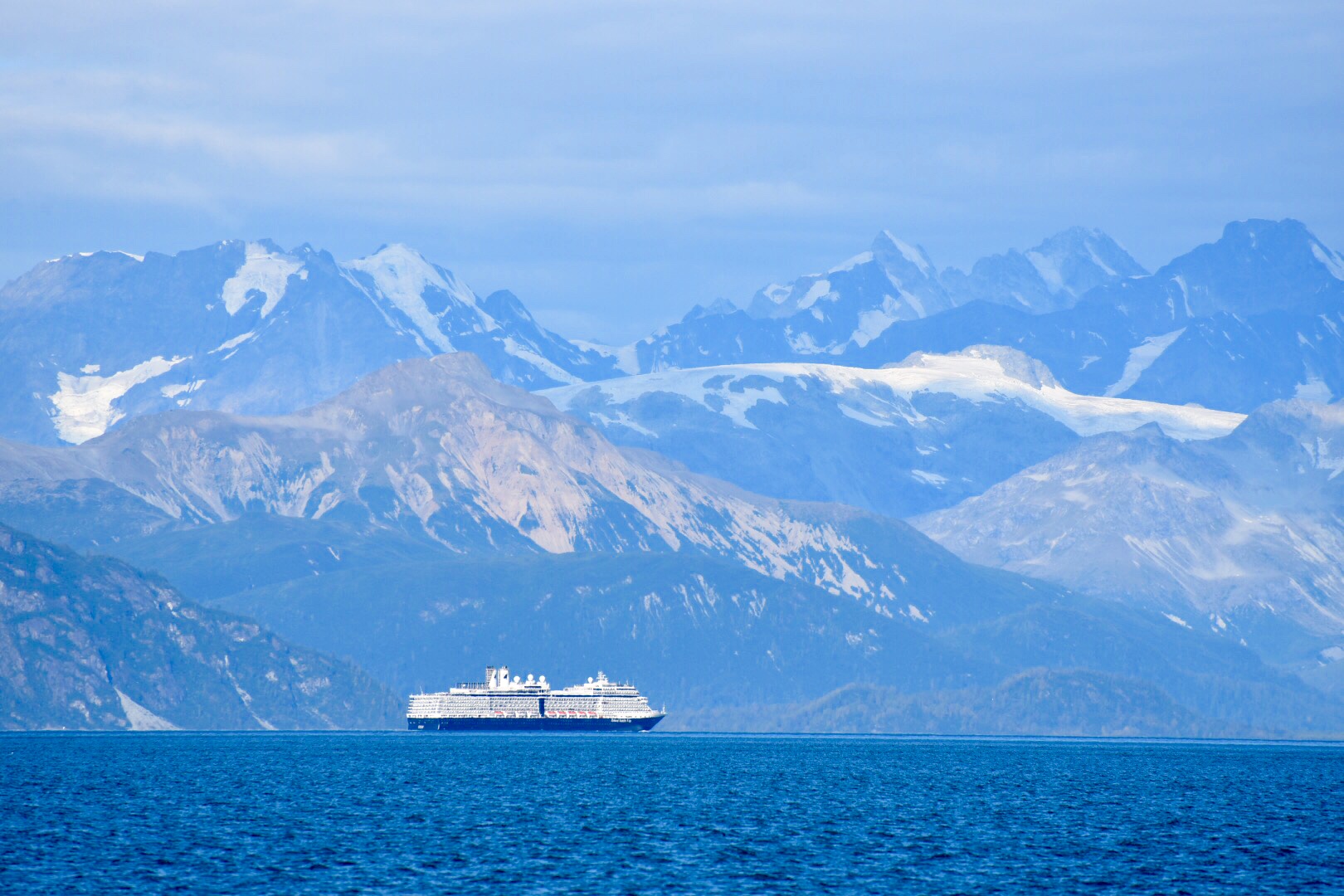 The seas are a little choppy today as we have a stiff 15 knot NW breeze. We stop along the cliffs of Gloomy Knob to admire several mountain goats grazing on the steep cliffs.
The seas are a little choppy today as we have a stiff 15 knot NW breeze. We stop along the cliffs of Gloomy Knob to admire several mountain goats grazing on the steep cliffs.
As we work our way “up bay” , we our get our first glimpse of the Grand Pacific Glacier 15 miles north.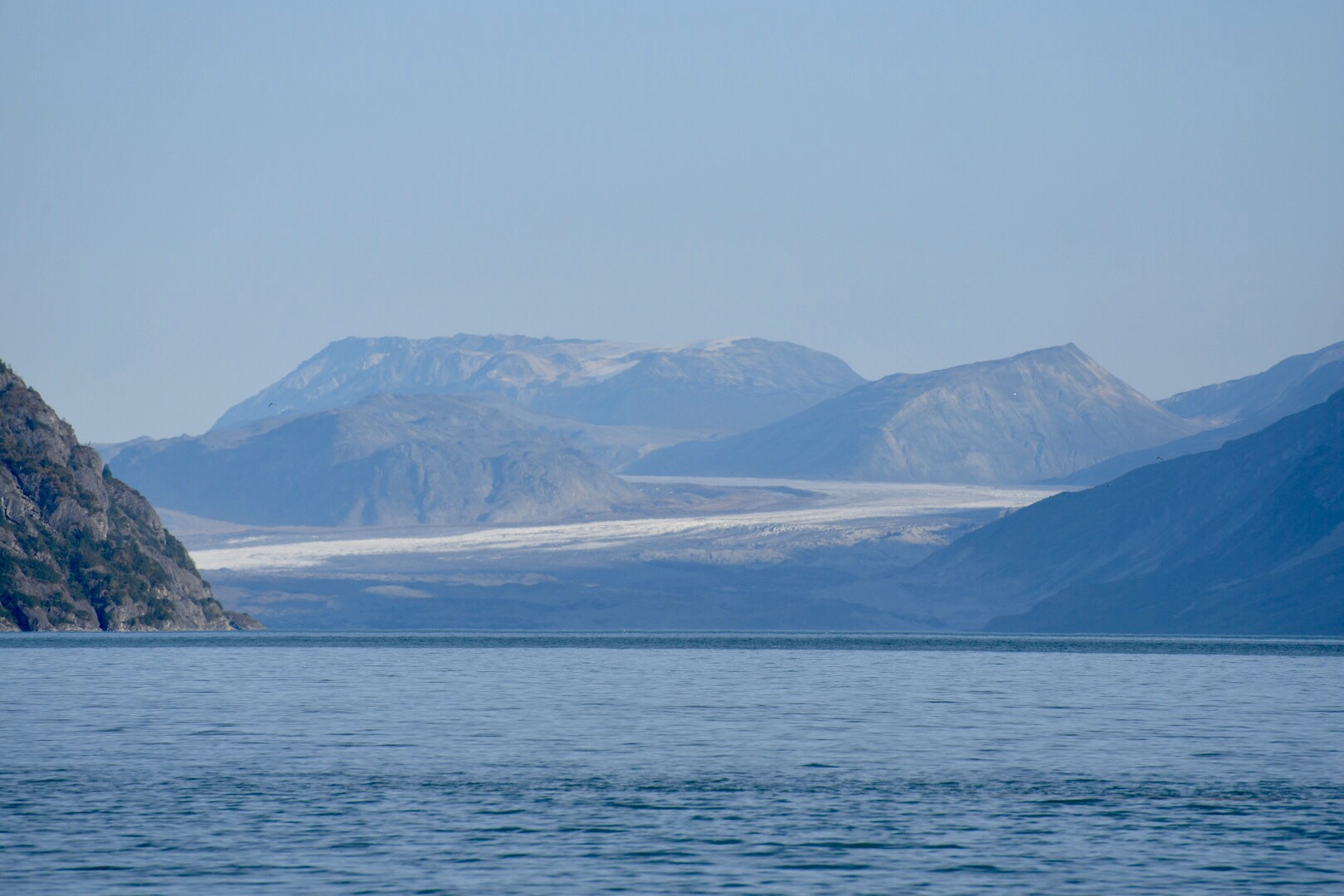
Reid Inlet is our home for the evening. After anchoring behind a small spit along the northwest shore, our kayak and paddle board are deployed for some exploring. At the head of our anchorage, one mile away, is the Reid Glacier.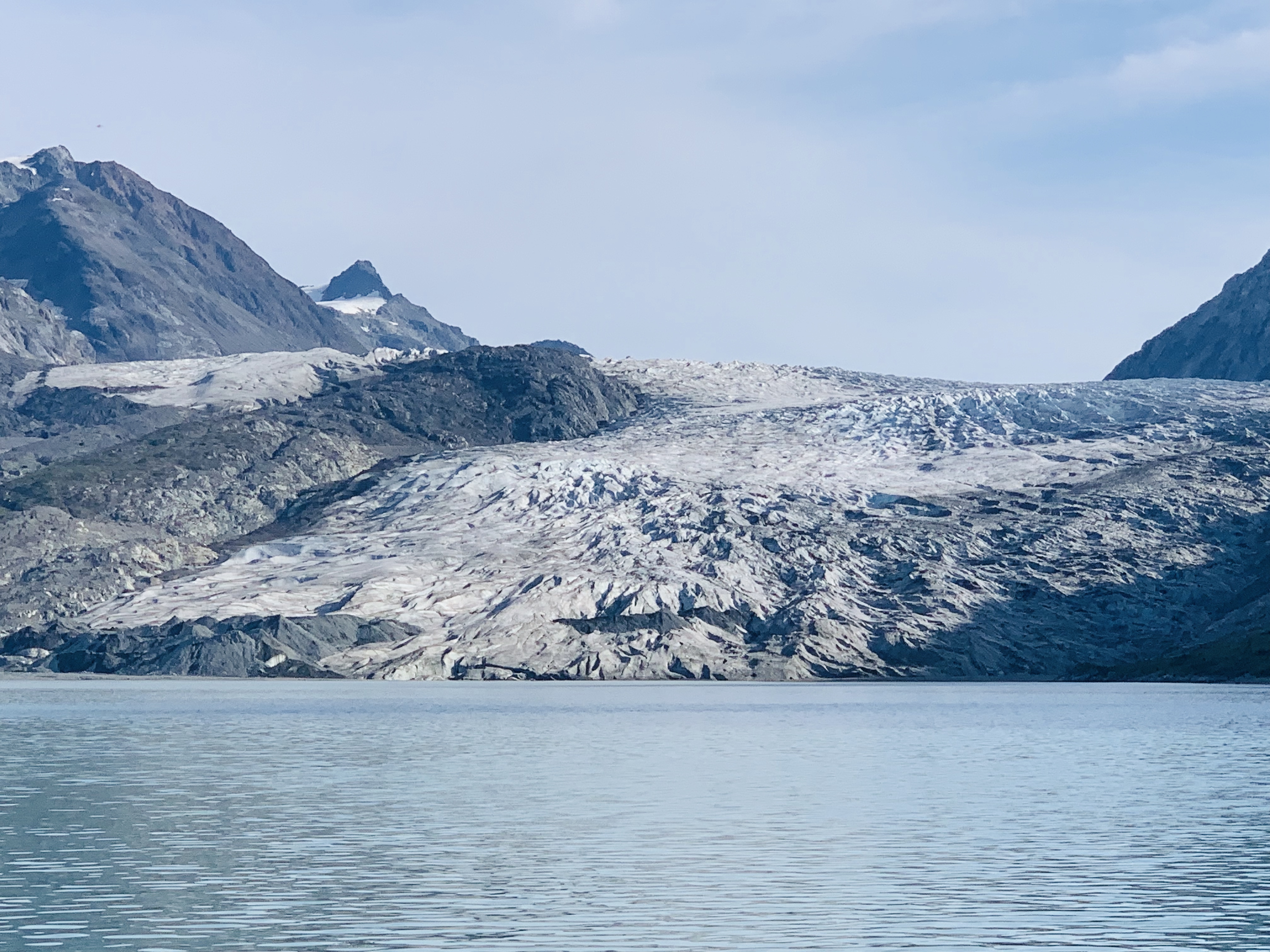 Cruise ship passengers don’t get the opportunity to explore this glacier as the bay is too small for the big ships. The snout of this glacier is now only touched by the waters at high tide. This glacier no longer produces ice bergs.
Cruise ship passengers don’t get the opportunity to explore this glacier as the bay is too small for the big ships. The snout of this glacier is now only touched by the waters at high tide. This glacier no longer produces ice bergs.
The sailboat Dorie joins us in the anchorage this evening.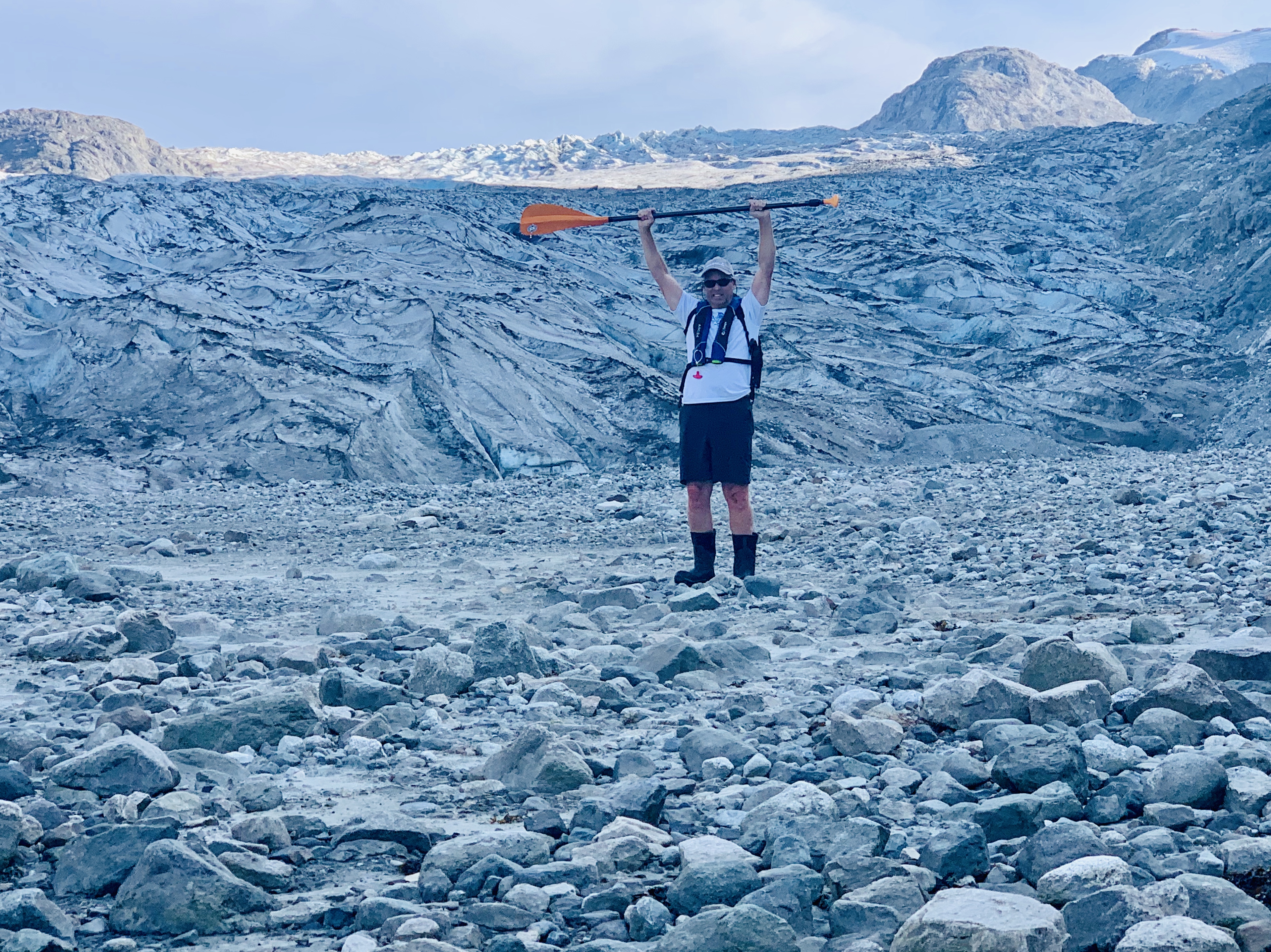
Reid Inlet to Shag Cove:
It was chilly overnight being anchored so near the glacier. The water temperatures have dropped ten degrees to a cold 50 degrees the further up bay we travel. We depart early this morning for our journey west to visit the glaciers before the massive cruise ships invade the space. Leaving Reid Inlet, we soon spot our first mini ice berg. The waters are mirror smooth which aids us in spotting the clear bergie bits floating in the water. The small Lamplugh Glacier is just a few miles up bay. It’s blue ice comes from the dense Brady Ice field.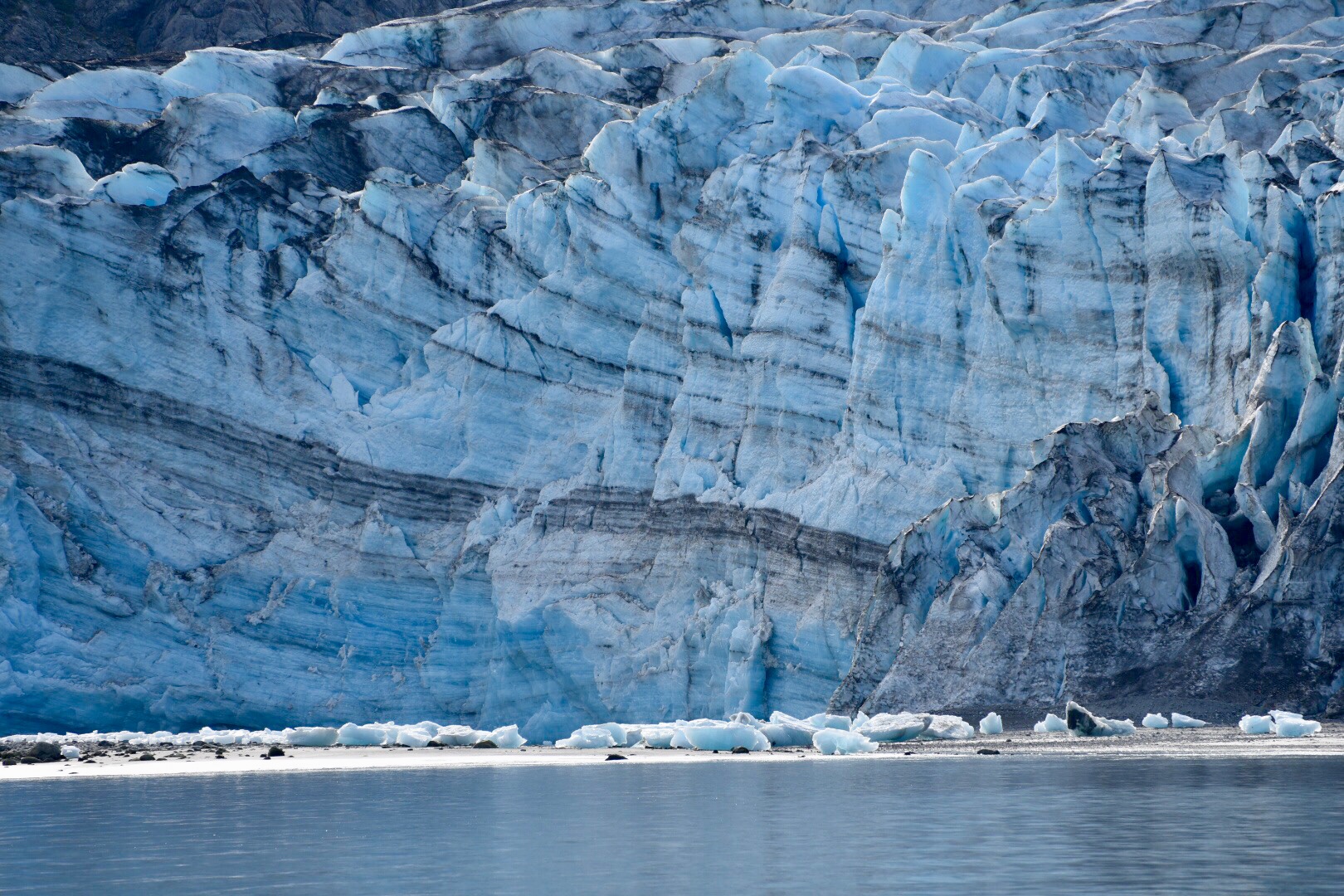
As we slowly ease our way up John Hopkins Inlet, the tall mountains close in around us. The ice bergs are small but more numerous. The scenery continues to amaze us.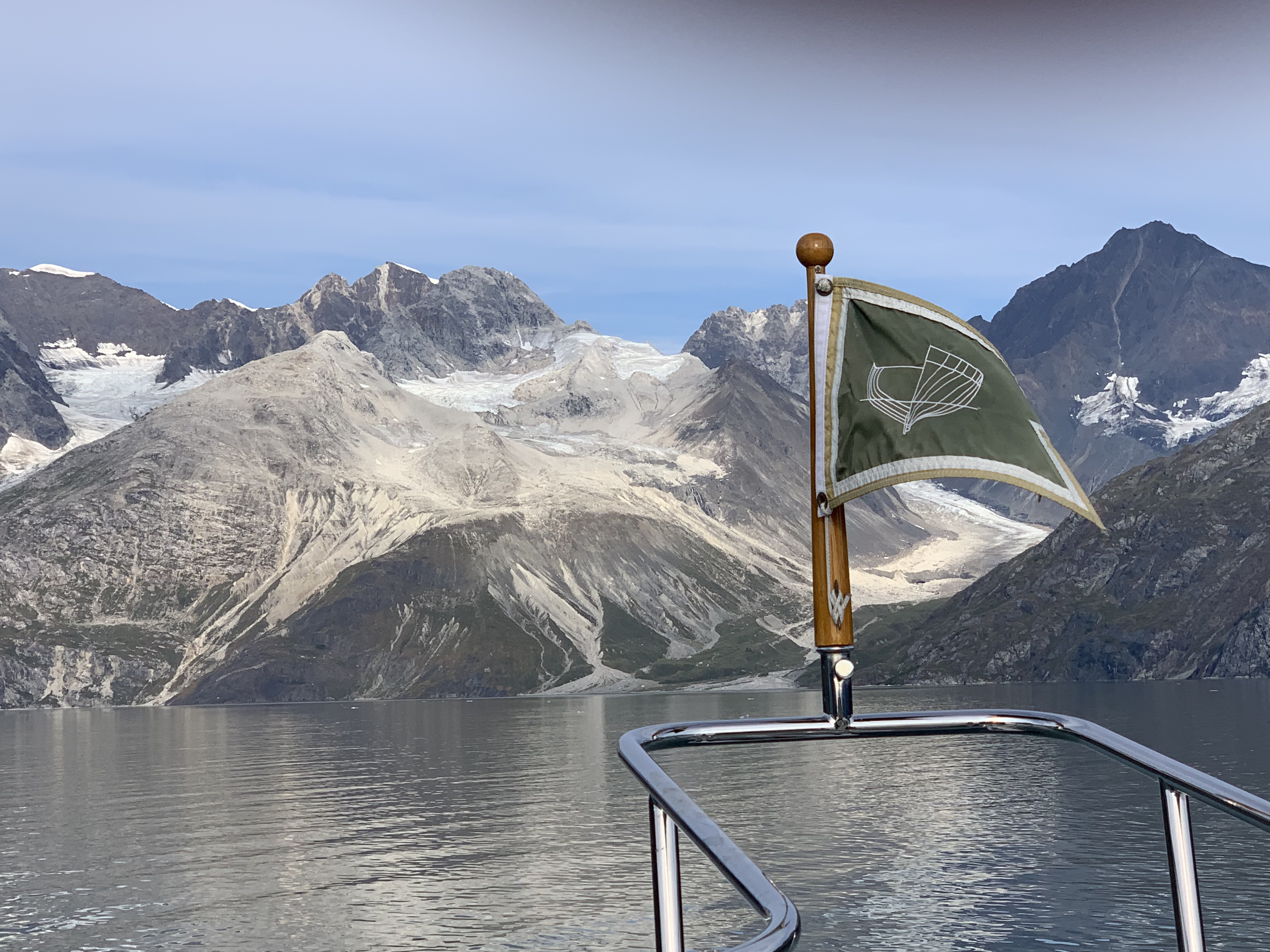 Rounding Jaw Point, we get our first glimpse of John Hopkins Glacier still 5 miles away.
Rounding Jaw Point, we get our first glimpse of John Hopkins Glacier still 5 miles away.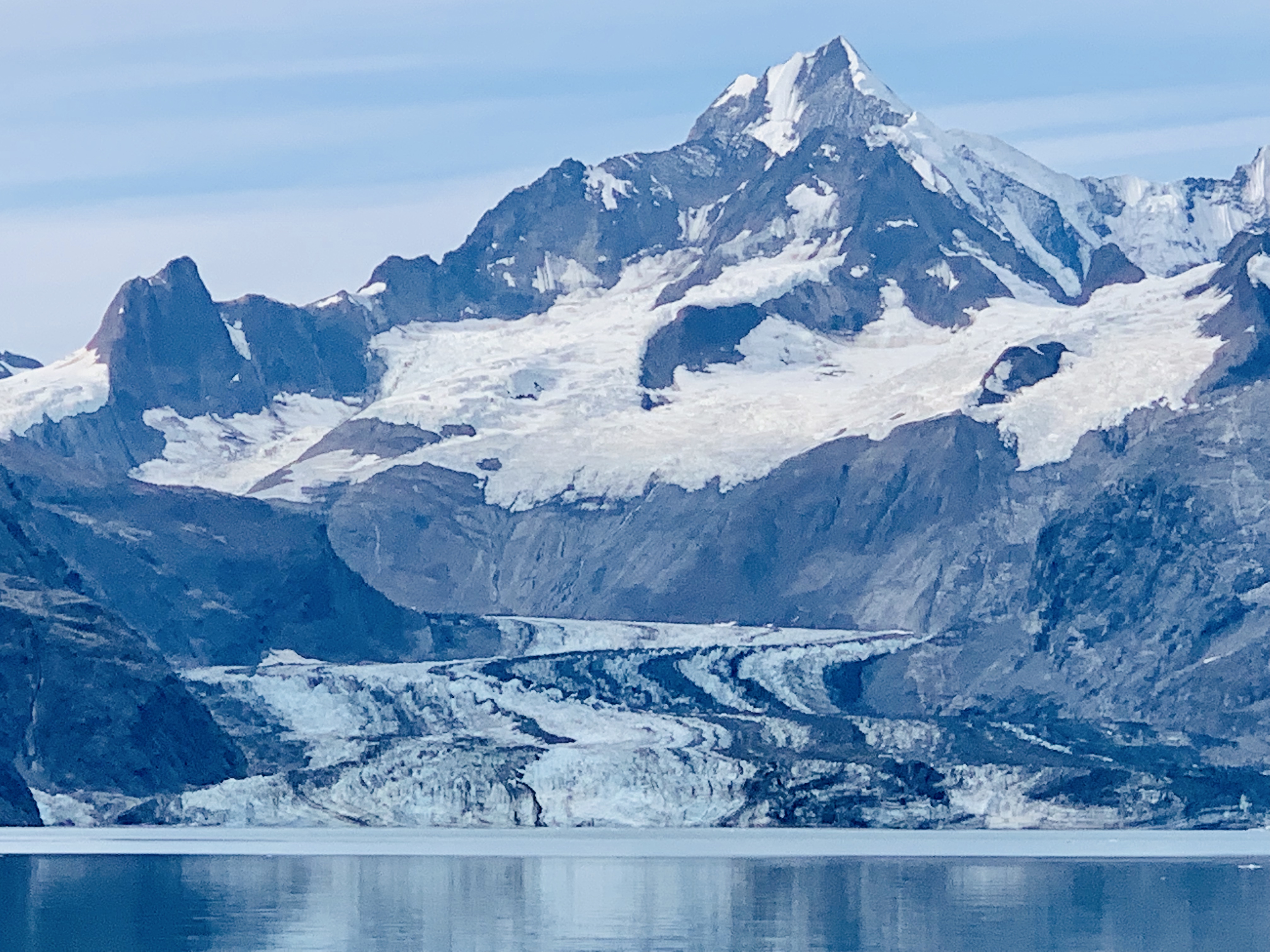 The cruise ships must stop here but we can continue closer. It is amazing how little ice there is in the water compared to when we were here last year. A tandem kayak eases past us after spending a night camped at the glacier. They hail us on the VHF for a weather report. Other than the kayakers, we have the entire glacier to ourselves. With little ice, we are able to navigate within a few miles of the glacier. What a special treat to drift amongst the ice and have the majesty of this special place all to ourselves.
The cruise ships must stop here but we can continue closer. It is amazing how little ice there is in the water compared to when we were here last year. A tandem kayak eases past us after spending a night camped at the glacier. They hail us on the VHF for a weather report. Other than the kayakers, we have the entire glacier to ourselves. With little ice, we are able to navigate within a few miles of the glacier. What a special treat to drift amongst the ice and have the majesty of this special place all to ourselves.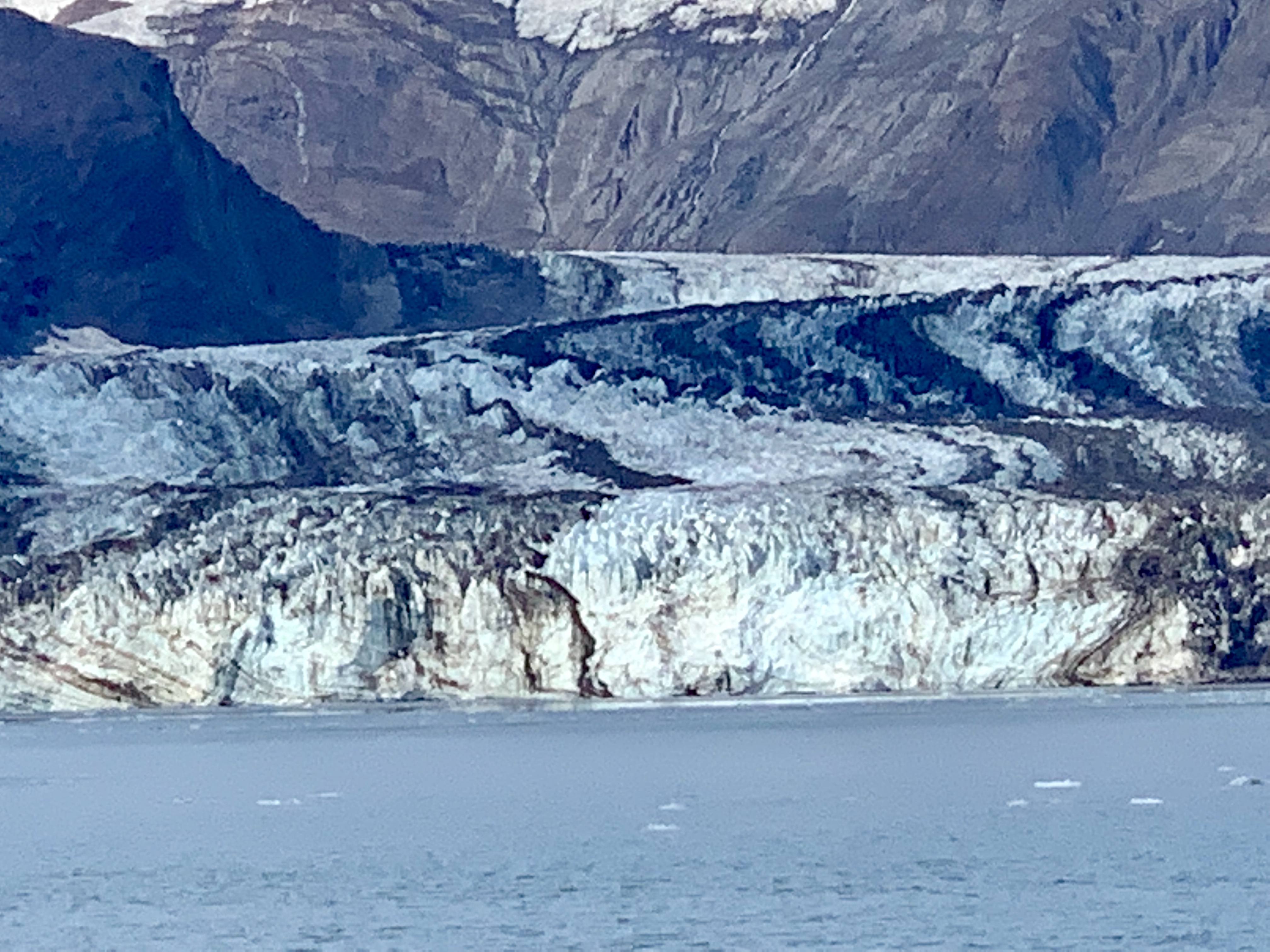
On our exit, we spot the massive Holland America cruise ship Westerdam as we round Jaw point. This is the first of several cruise ships expected in the park today. Our early arrival and departure tactic worked well for us this visit.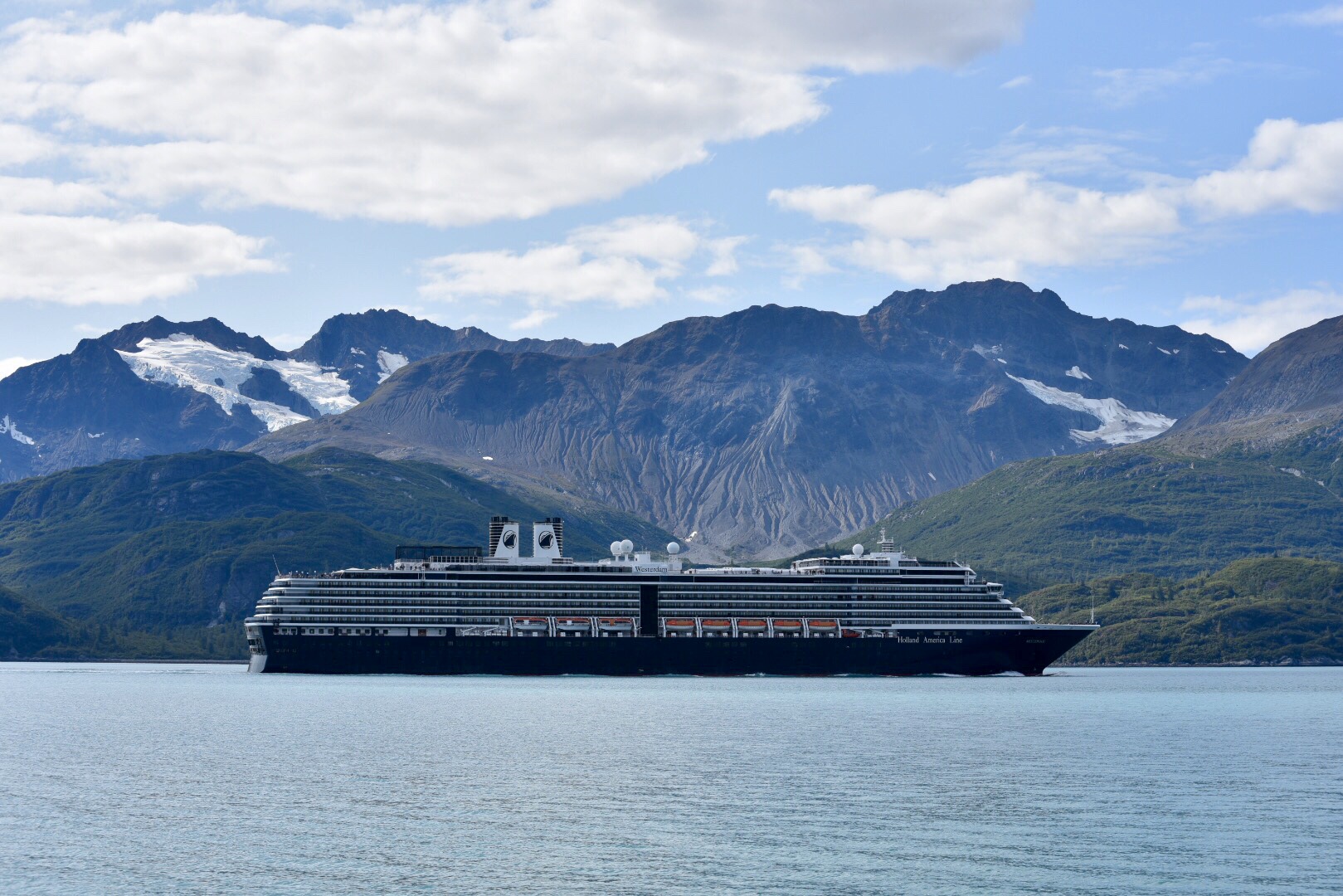
Several sea otters entertain us on our trip “down bay”.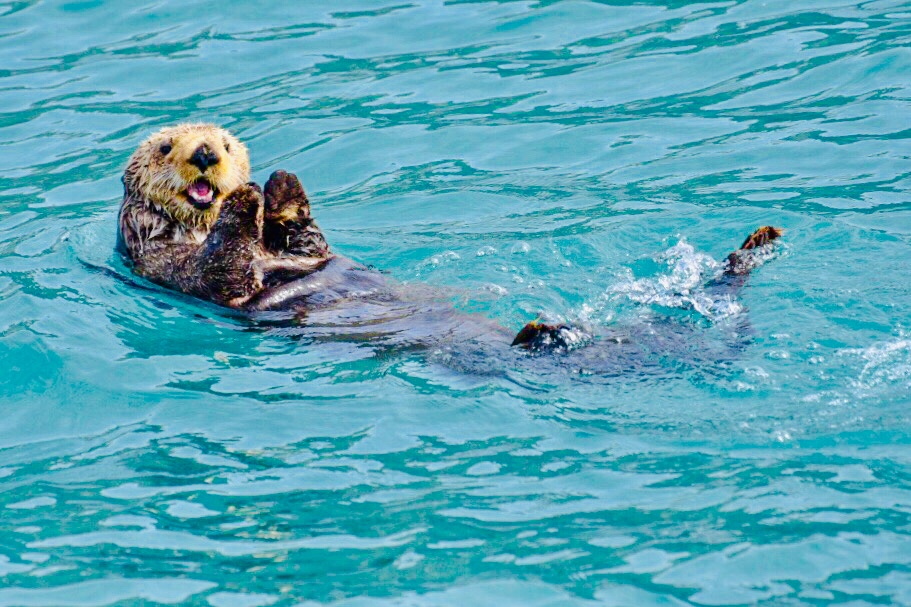 Sea otters were reintroduced to SE Alaska in the 1960’s. In the last twenty years the population in Glacier Bay has gone from zero to almost 9000.
Sea otters were reintroduced to SE Alaska in the 1960’s. In the last twenty years the population in Glacier Bay has gone from zero to almost 9000.
Just as we are entering Geikie Inlet, a lone humpback is spotted cruising the shoreline. Our anchorage for the evening is Shag Cove, a beautiful u-shaped valley with granite walls rising 1000 feet on both sides. We anchor at the head of the bay in front of an active salmon stream.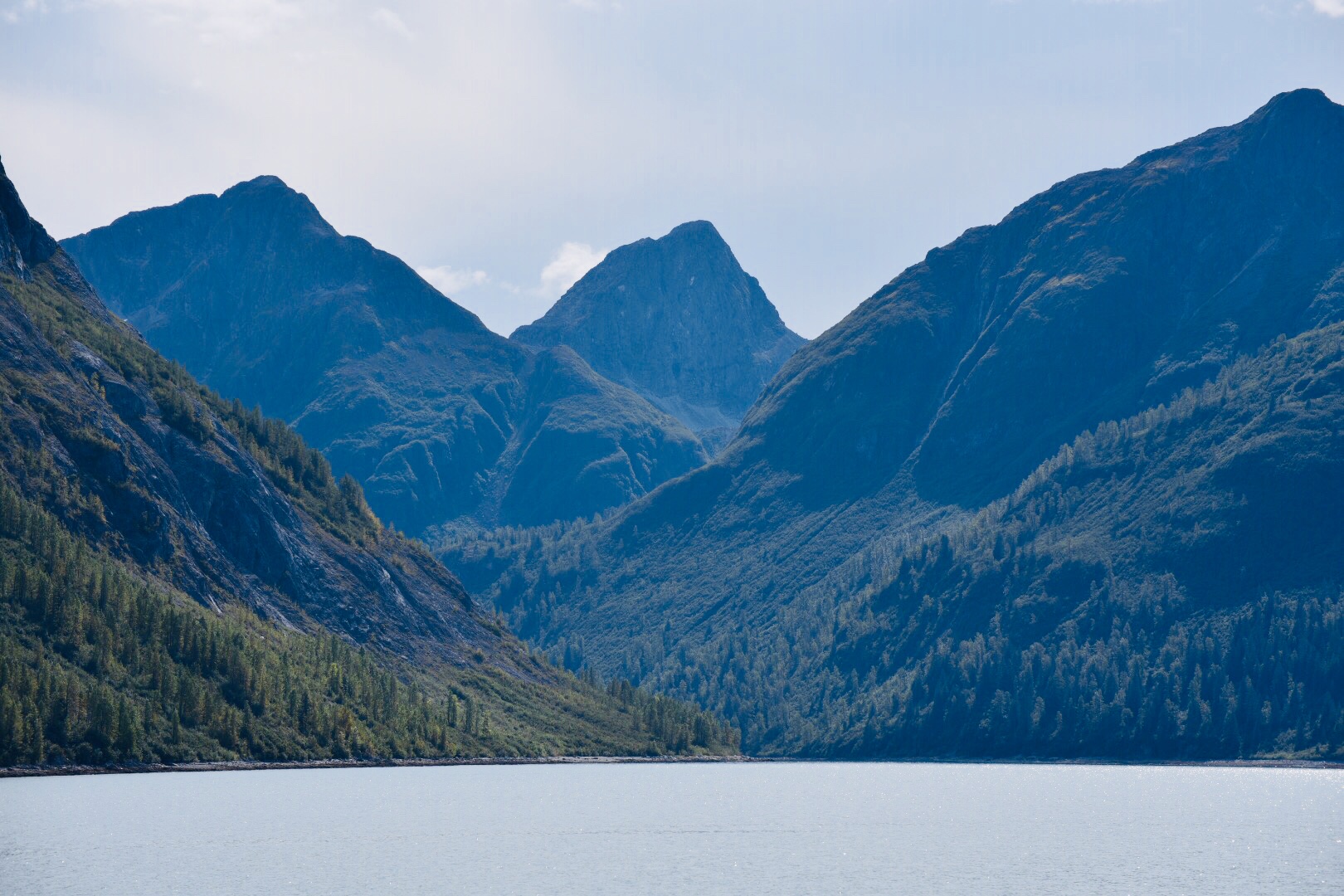
We are entertained this afternoon by several Harbor Porpoise feeding in the bay. A black bear makes a brief appearance while fishing for salmon in the stream.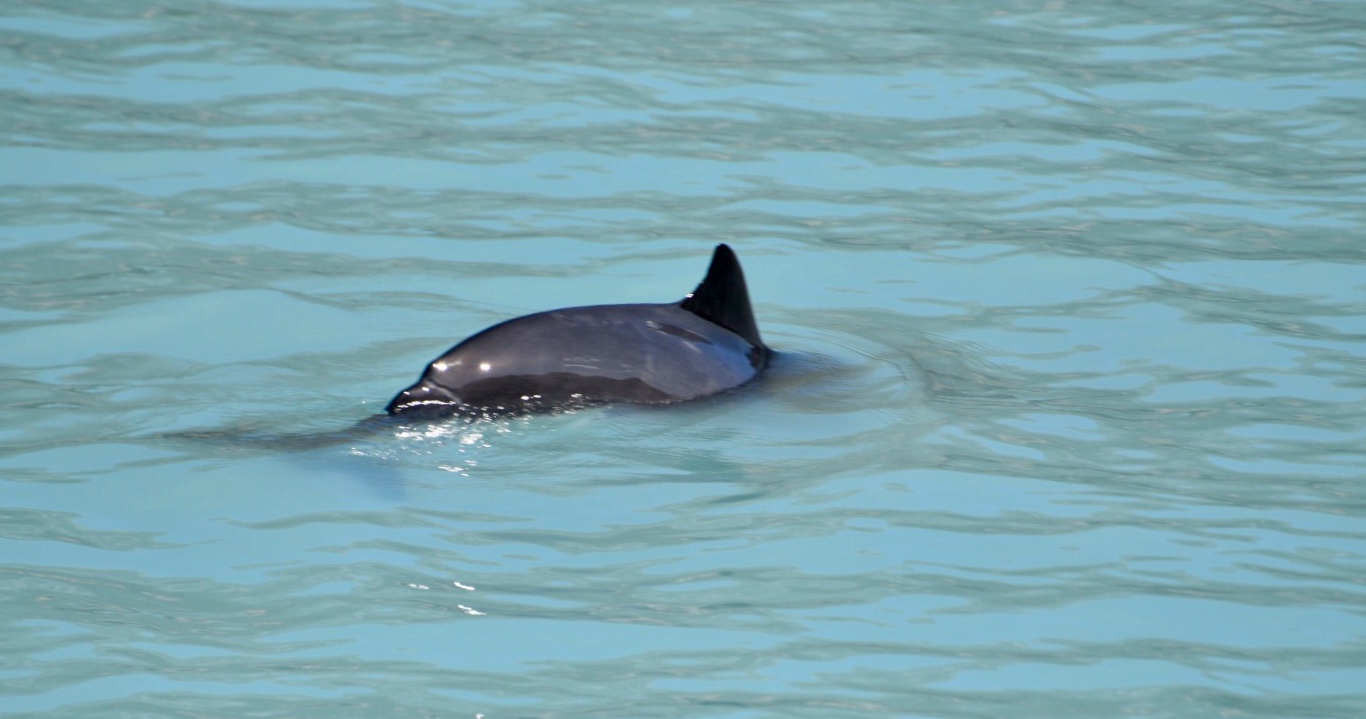
This evening, we head out in the kayaks to explore the anchorage. As we are enjoying the quiet solitude, a strange buzzing sound suddenly is heard coming from our boat. The sound briefly mystifies us until we realize It is the line paying out on our halibut rig that we had set out earlier in the day. It is paying out at a very fast clip! We race back to the boat hoping that all of our line doesn’t disappear before we can reach it. After some scrambling to get our kayaks out of the way and the harpoon set up, we have our biggest halibut of the year secured on the back deck. He weighs 69 pounds and is 57” long.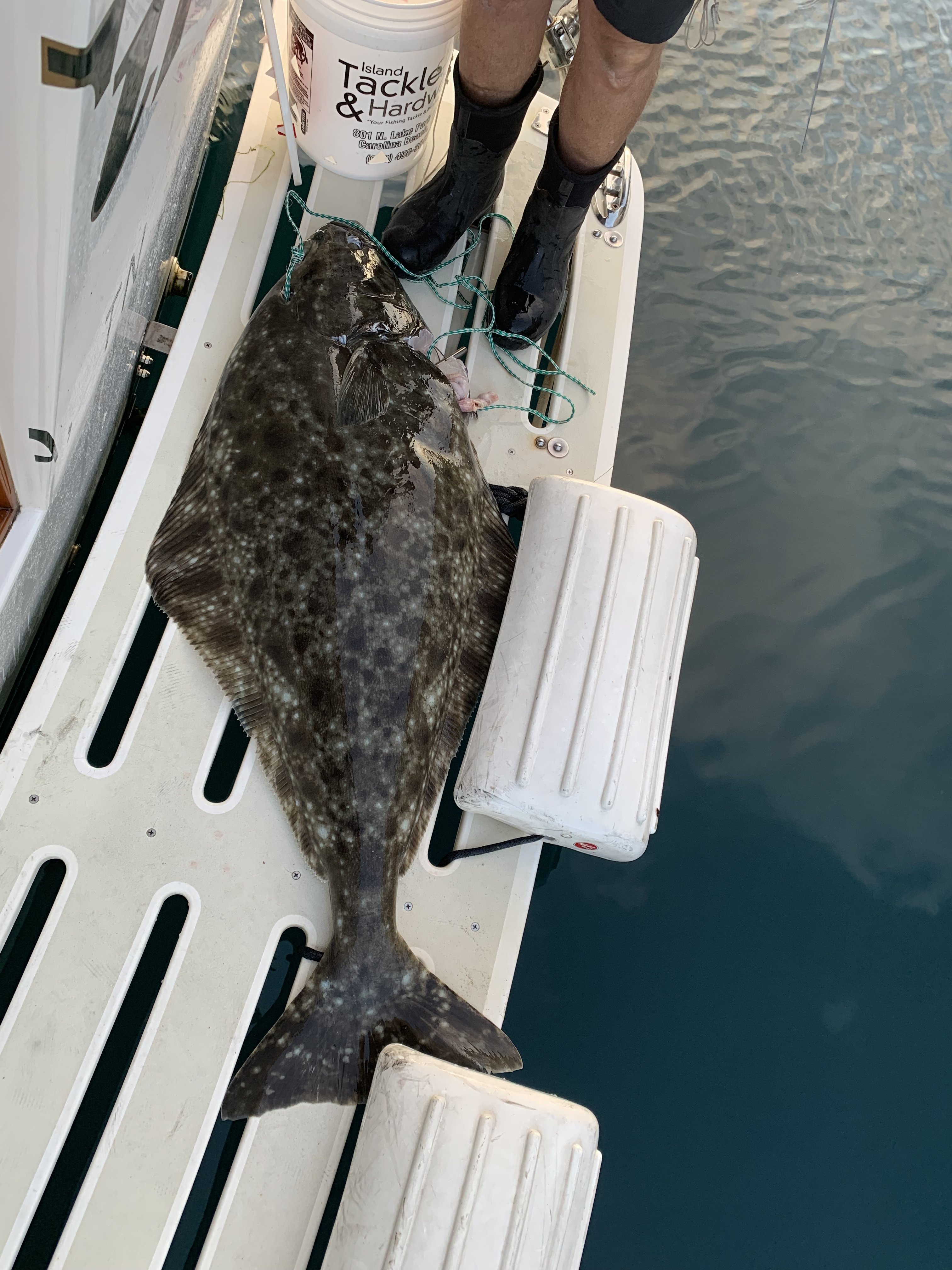
While cleaning our fish, we have some more entertainment as a harbor seal comes over to investigate the smells. We treat him to some halibut scraps and he disappears. A massive brown bear next appears on shore. Is he winding the fish? We don’t know but hope he stays on the beach.
What a day in Glacier Bay!
Shag Cove to Bartlett Cove:
We awake to a light drizzle and a veil of fog is obscuring the tall granite peaks. With the weather forecast not looking promising for the next few days, we decide to head back to park headquarters and enjoy some of their nature and cultural programs at the visitor center.
We first make a detour back to South Marble Island to check out the wildlife. The concentration of mammals and bird life never ceases to amaze us in these protected zones. While watching the sea otters and puffins, we soon see a humpback rocketing straight out of the water in full breach mode.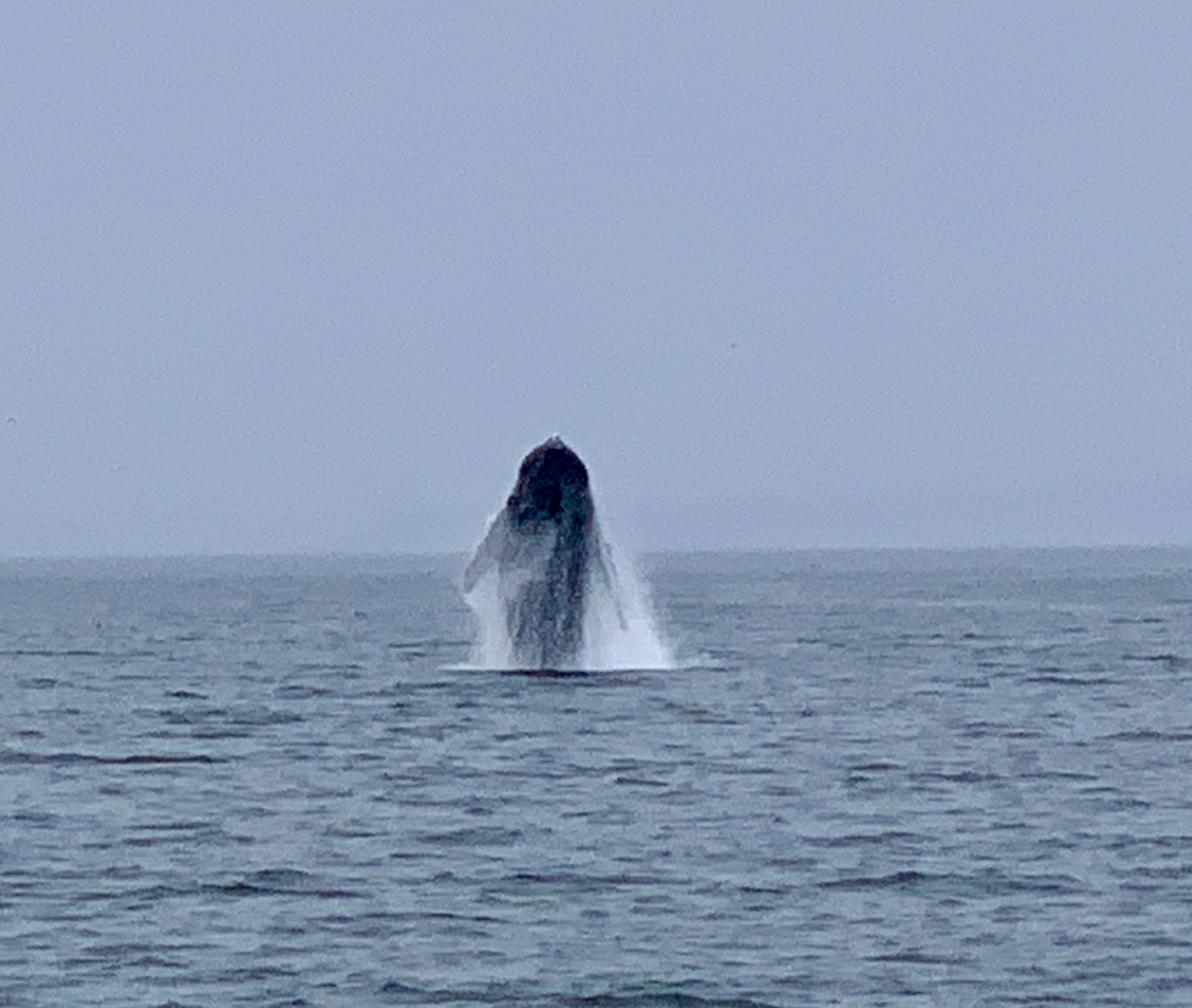 We watch for the next half hour as he continues to breach and fluke slap repeatedly.
We watch for the next half hour as he continues to breach and fluke slap repeatedly.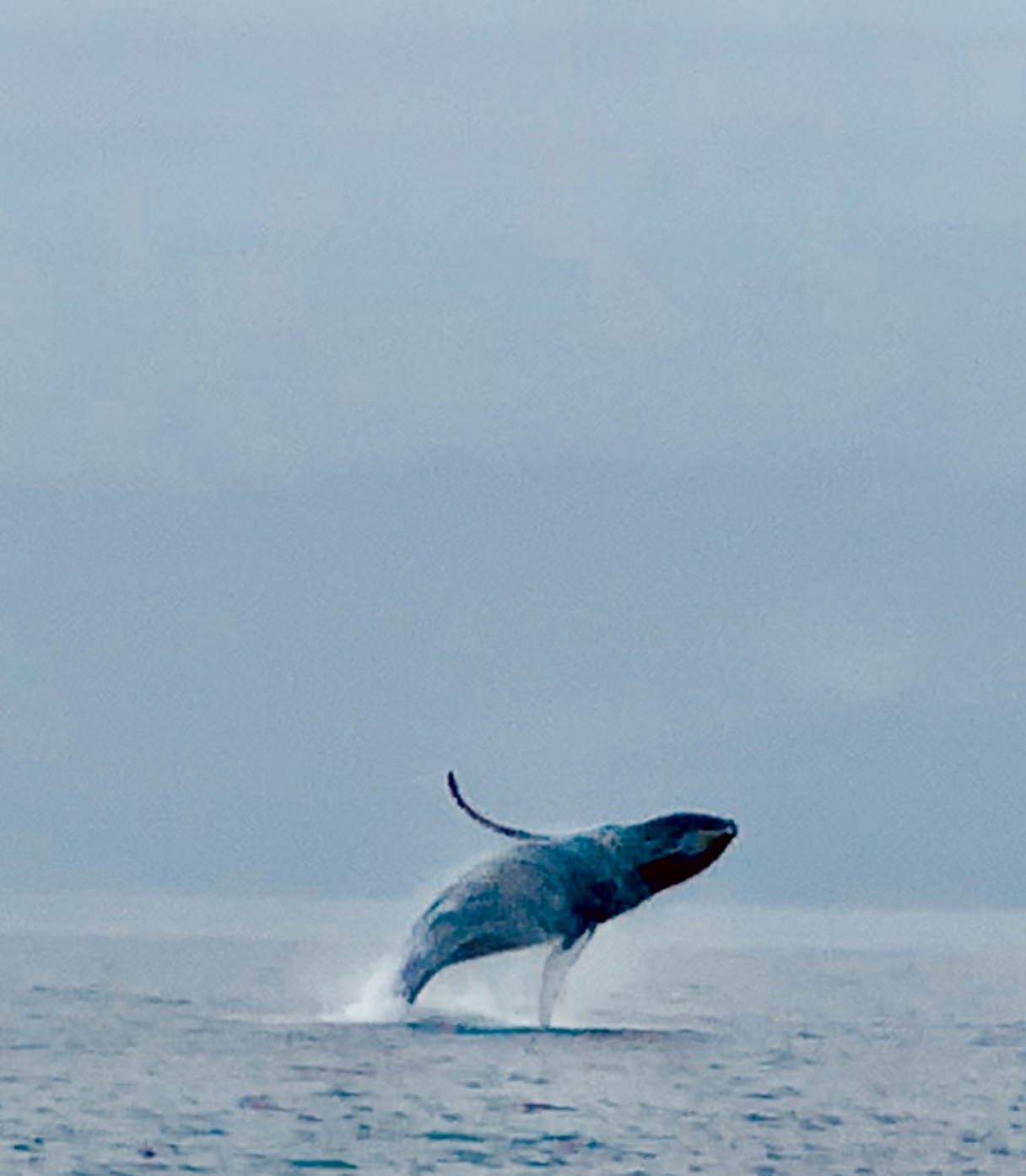
We anchor in Bartlett Cove just off the National Park docks and spend two days attending most of the programs the park has to offer.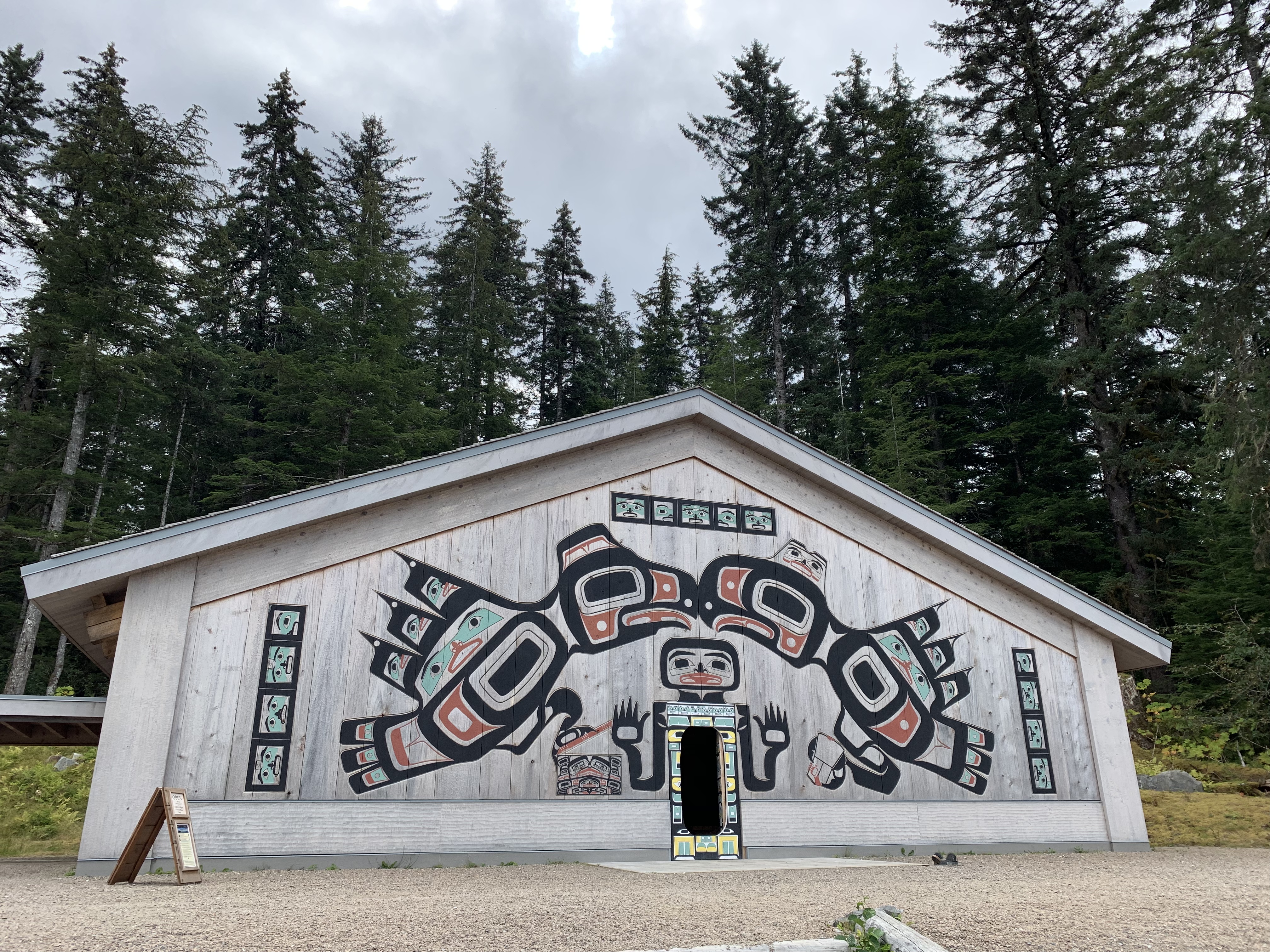 The restaurant meals looked wonderful but we have a refrigerator full of fresh halibut that must be consumed.
The restaurant meals looked wonderful but we have a refrigerator full of fresh halibut that must be consumed.
With an improving weather forecast, it is now time to point our bow southeast towards Petersburg.
Thank you Glacier Bay for an amazing week!